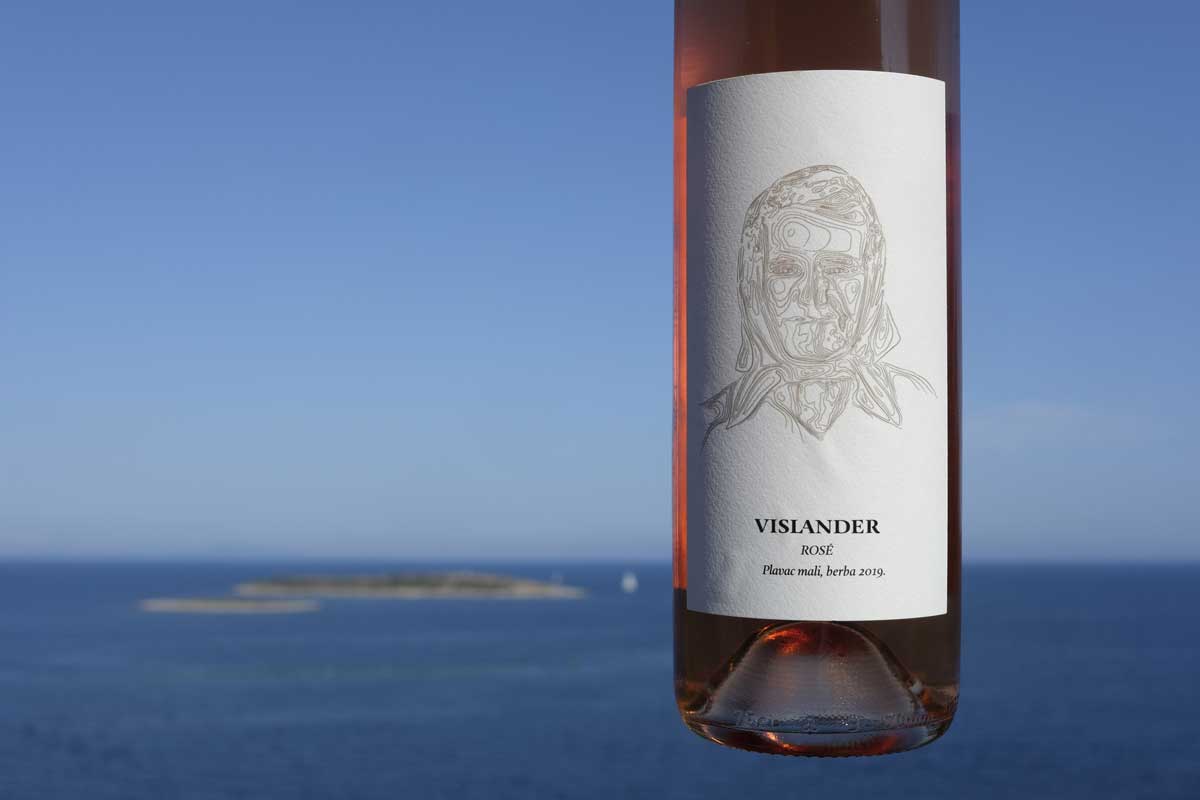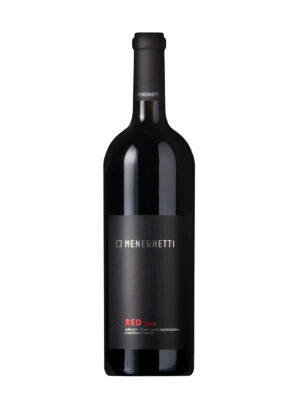Your Next Favourite Island Wine
 What is an island wine? To most Europeans, the first association for island wines would be either the Italian or Greek islands. That is understandable due to the perception of Italy and Greece as historically wine countries. No one can argue that some of the most famous islands for winemaking are, in fact, Italian or Greece. From Sardinia and Sicily to Crete and Santorini, these islands are true treasures of indigenous varieties and home to ancient wine culture.
What is an island wine? To most Europeans, the first association for island wines would be either the Italian or Greek islands. That is understandable due to the perception of Italy and Greece as historically wine countries. No one can argue that some of the most famous islands for winemaking are, in fact, Italian or Greece. From Sardinia and Sicily to Crete and Santorini, these islands are true treasures of indigenous varieties and home to ancient wine culture.
However, Europe boasts diverse islands that contribute significantly to winemaking. From the volcanic soils of the Azores in Portugal to the rugged coastlines of Corsica in France and the charming vineyards of Madeira to the lesser-known gems like Pantelleria in Italian far south or Lanzarote in Spain’s Canary Islands, each island brings a unique set of characteristics that find their expression in the wines produced there.
Croatian islands have a long and storied history of winemaking that dates back to times before the Romans. Croatia’s unique geography, with its numerous islands scattered along the Adriatic coast, provides an ideal environment for viticulture. Each island boasts its distinct winemaking traditions, indigenous grape varieties, and diverse terroirs, making it a fascinating destination for wine enthusiasts.
What island is known for wine?
Several Old World islands are known for their wine production, each offering unique styles and grape varieties that reflect their specific terroir. Some of the most renowned islands known for wine include:
- Corsica, France
- Crete, Greece
- Ischia, Italy
- Madeira, Portugal
- Santorini, Greece
- Sardinia, Italy
- Sicily, Italy
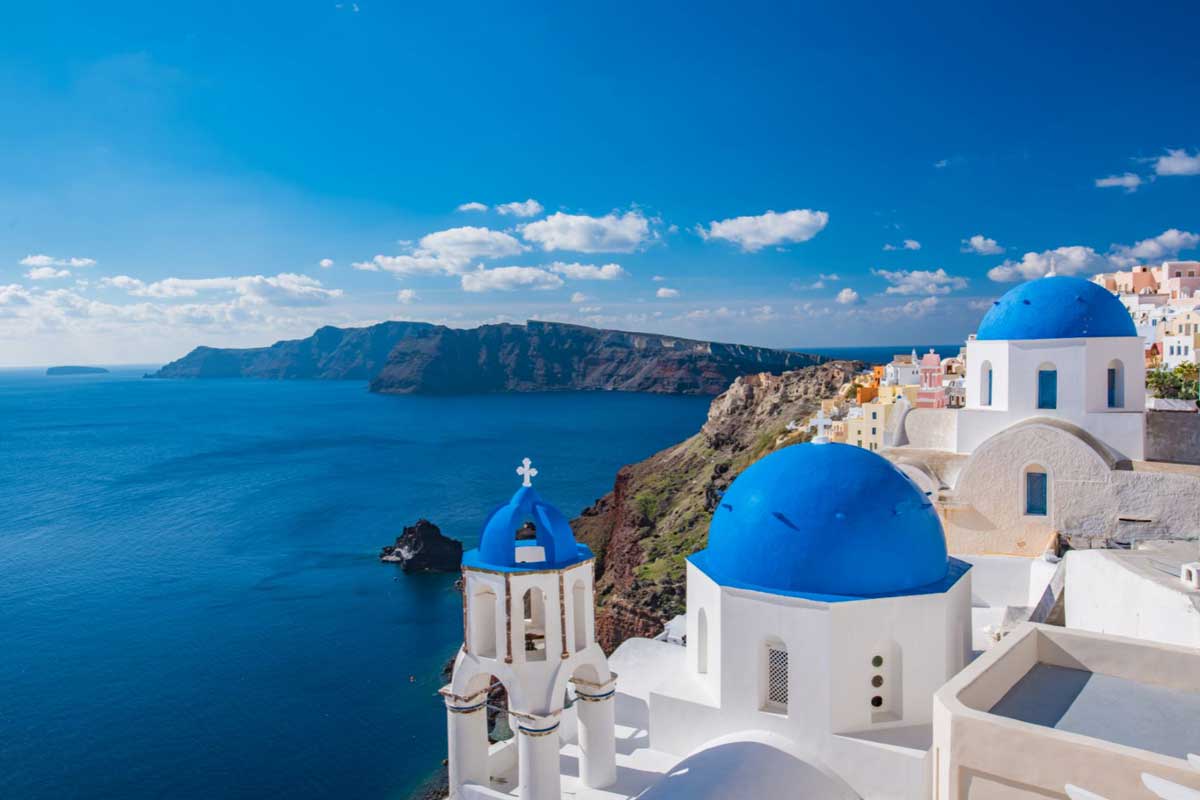
Corsica, France
Located in the Mediterranean Sea, Corsica has a long history of winemaking, influenced by various cultures. It produces a range of red and white wines using indigenous grape varieties like Nielluccio and Sciaccarello. The island’s rugged terrain and diverse microclimates contribute to the unique character of its wines.
Crete, Greece
The largest of the Greek islands, Crete, has been producing wine for over 4,000 years. It is known for its native grape varieties like Thrapsathiri, Vidiano, Vilana, Liatiko and Kotsifali. The island’s warm climate and varied landscapes create various wine styles.
Ischia, Italy
Located in the Gulf of Naples, Ischia is an Italian island famous for its mineral-rich volcanic soils, which contribute to the unique character of its wines. It produces various wines, including Biancolella, Forastera, and Piedirosso.
Madeira, Portugal
This Portuguese island in the Atlantic Ocean is renowned for its fortified wines, often enjoyed as an aperitif or dessert wine. Madeira wines are aged using a unique heating process called “estufagem,” which imparts distinct flavours and longevity to the wines.
Santorini, Greece
Famous for its stunning landscapes and whitewashed buildings, Santorini is also known for its unique viticulture. The island’s volcanic soils, strong winds, and traditional grape-growing methods produce exceptional wines, particularly the crisp and mineral-driven Assyrtiko whites.
Sardinia, Italy
The second-largest island in the Mediterranean, after Sicily, has a long history of viticulture. The island boasts an array of indigenous grape varieties like Cannonau (Grenache), Vermentino, and Nuragus, as well as international varieties. Red and white, Sardinian wines reflect the island’s diverse landscapes, from its coastal vineyards influenced by the sea breeze to the inland hills and mountains.
Sicily, Italy
The largest Mediterranean island, Sicily, has a rich winemaking history dating back thousands of years. It produces a diverse range of red and white wines, using indigenous grape varieties like Nerelo Mascalese, Nocera, Nero d’Avola, Frappato, Perricone and Catarratto, Carricante, Grillo, Zibbibo, Inzolia as well as international varieties. The volcanic soils of Mount Etna contribute to the distinctive character of wines produced in this region.
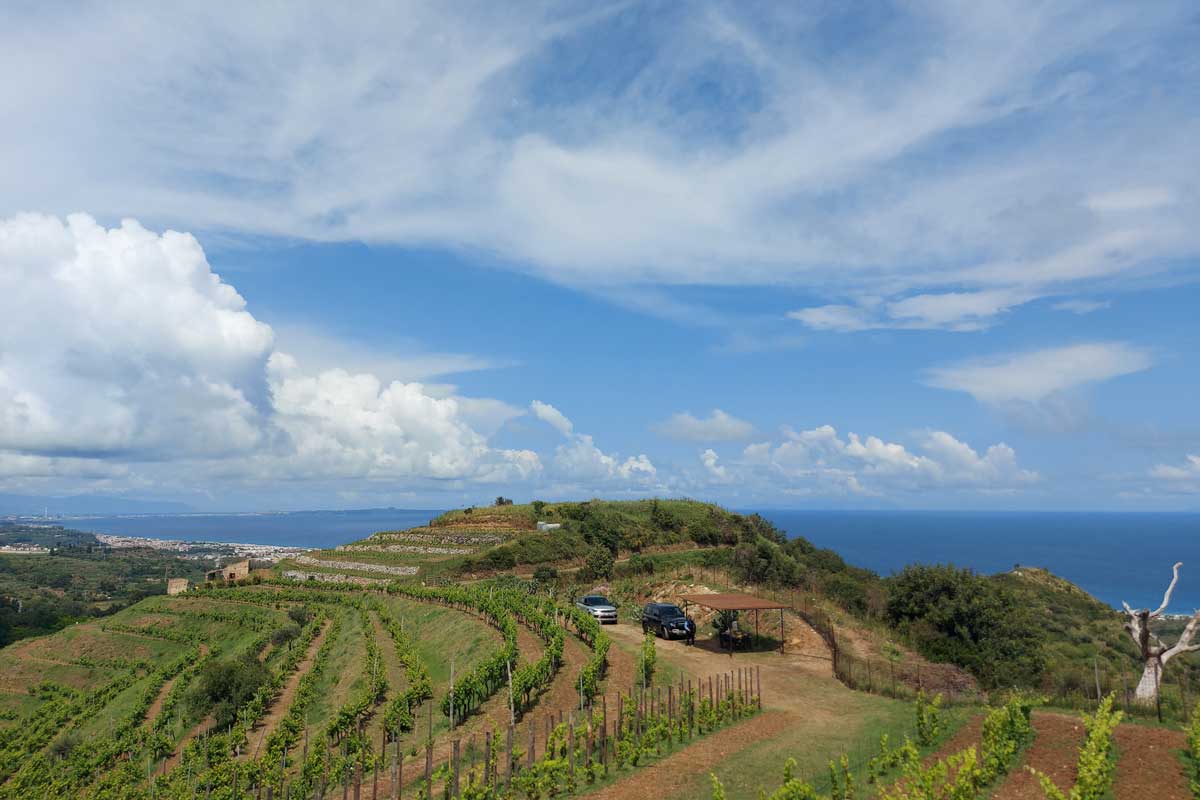
These islands, among others, have carved out a reputation for their distinctive wines, showcasing the influence of their specific climates, soils, and traditional winemaking methods. When exploring island wines, enthusiasts can delight in the diversity and uniqueness that each island’s wines bring to the world of viticulture.
What wine is from the Mediterranean islands?
Wines from the Mediterranean islands encompass various styles and grape varieties, each reflecting their respective islands’ unique terroir and winemaking traditions. Some of the well-known wines from the Mediterranean islands include:
- Assyrtiko from Santorini, Greece: A crisp and mineral-driven white wine made from the indigenous Assyrtiko grape, which thrives in the volcanic soils of Santorini.
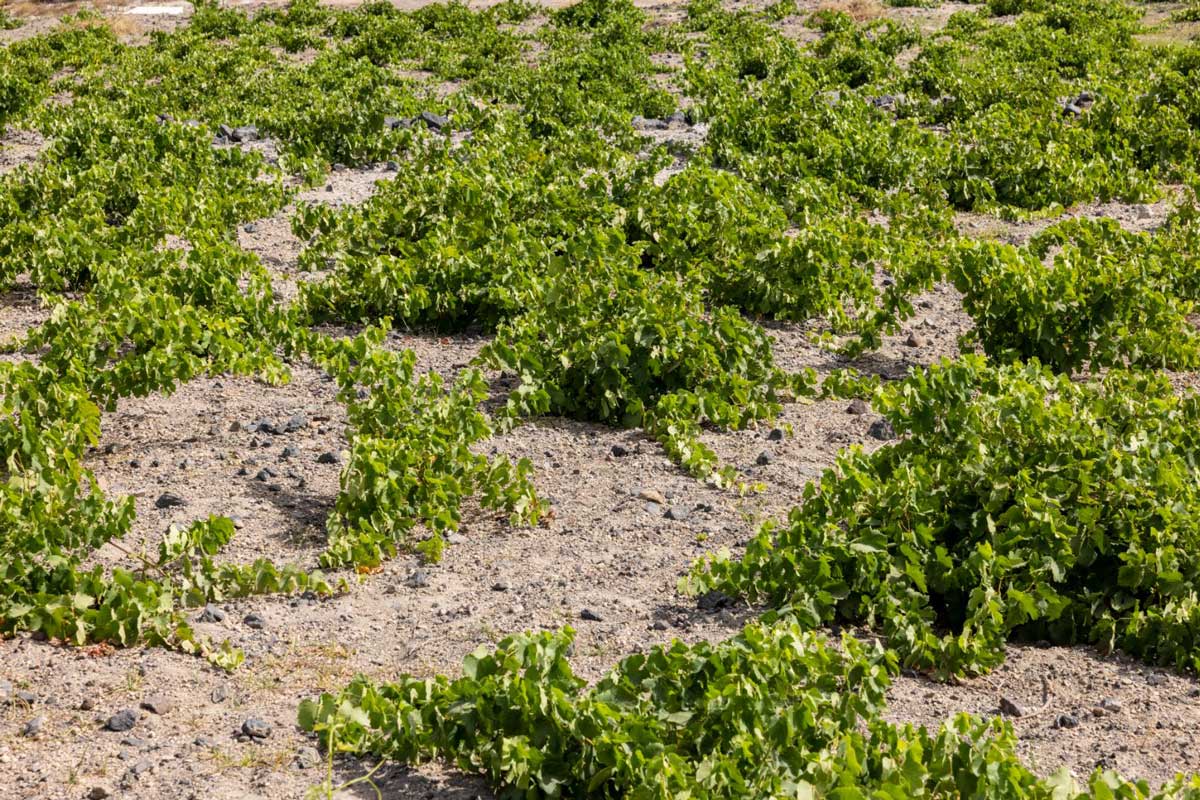
Assyrtiko vineyard - Cannonau from Sardinia, Italy: This red variety, known as Grenache in other parts of the world, gives unique wines when produced on the island of Sardinia
- Vermentino from Corsica, France: A fresh and aromatic white wine made from the Vermentino grape, grown on the French island of Corsica.
- Commandaria from Cyprus: One of the oldest named wines in the world, Commandaria is a sweet wine made from sun-dried grapes in Cyprus.
- Malvasia from Madeira, Portugal: Madeira wines, including Malvasia, are famous for their unique ageing process and distinctive flavours, often featuring rich caramel and nutty notes.
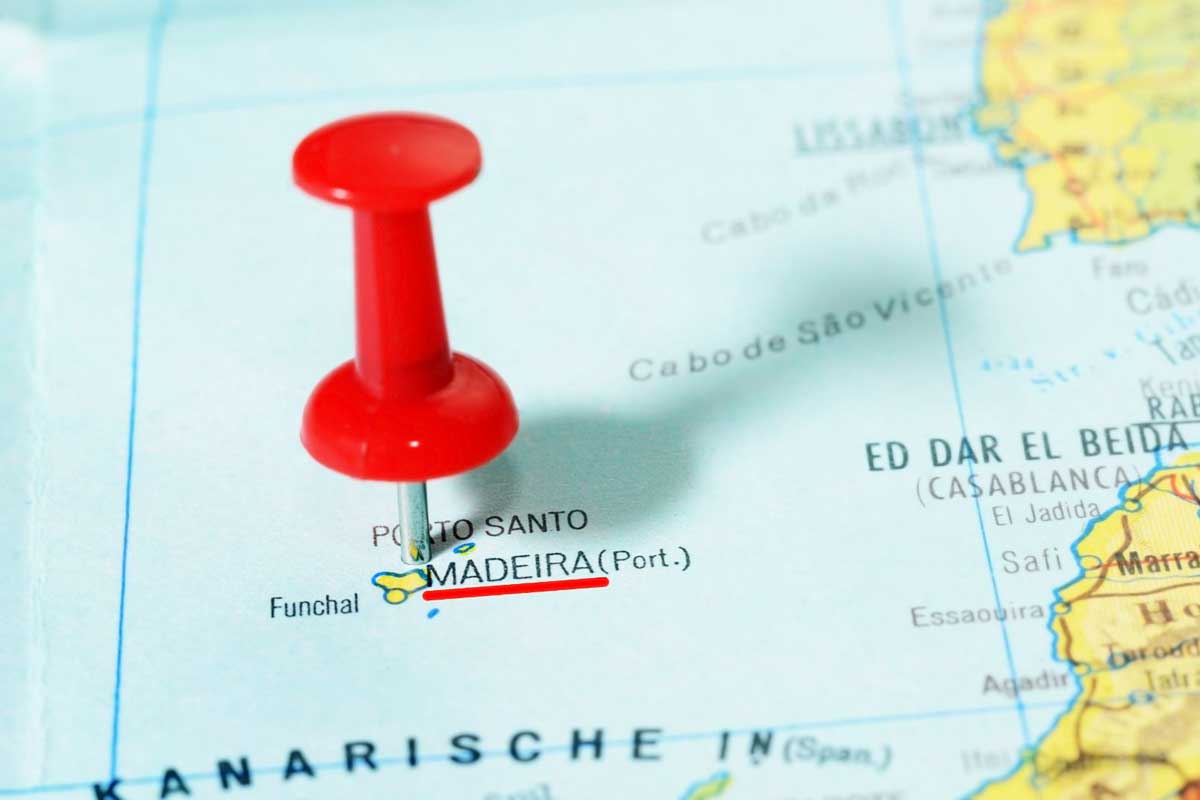
- Nero d’Avola from Sicily, Italy: This famous red wine made from the Nero d’Avola grape, which thrives in the sunny climate of Sicily, offers flavours of dark fruits and spice.
- Pošip from Korčula, Croatia: Pošip is a flavorful and aromatic white wine made from the Pošip grape, originating from the island of Korčula.
- Listán Negro from Lanzarote, Spain (Canary Islands): This red wine is made from the Listán Negro grape, grown on the volcanic soils of Lanzarote, resulting in wines with unique mineral and earthy characteristics.
These wines, among many others, highlight the richness and diversity of the Mediterranean islands’ winemaking heritage. From refreshing whites to bold reds and unique sweet wines, the Mediterranean islands offer a delightful assortment of wines that reflect these charming island regions’ sun-kissed and distinct landscapes.
Croatian islands famous for their wine
Although belonging to the same Old World traditions and are recognised as an ideal summer vacation place, Croatian islands still need to be recognised for their wines.
The lack of global fame for Croatian island wines can be attributed to the following four main factors:
- Limited Production and Export: Croatian island wineries often have limited production capacities, and their focus has traditionally been on domestic consumption rather than international export. As a result, their wines are less widely available in foreign markets, which limits their exposure and global recognition.
- Limited Marketing and Promotion: Many Croatian island wineries are small, family-owned operations that may need more marketing budgets or global distribution networks. Without adequate marketing and promotion efforts, it becomes challenging for these wineries to gain widespread attention in the competitive global wine market.
- Regional and Cultural Focus: Croatia’s wine culture has been primarily centered around local traditions and consumption rather than seeking international recognition. This regional focus is also influenced by significant tourist consumption.
- Lack of Wine Recognition Infrastructure: The global wine industry is highly competitive, and establishing a reputation for quality and consistency takes time and resources. Some Croatian island wineries may need more infrastructure or resources to participate in international wine competitions or receive critical reviews from renowned wine publications, significantly impacting their visibility and reputation. Although Croatian wines are certainly constantly gaining recognition.
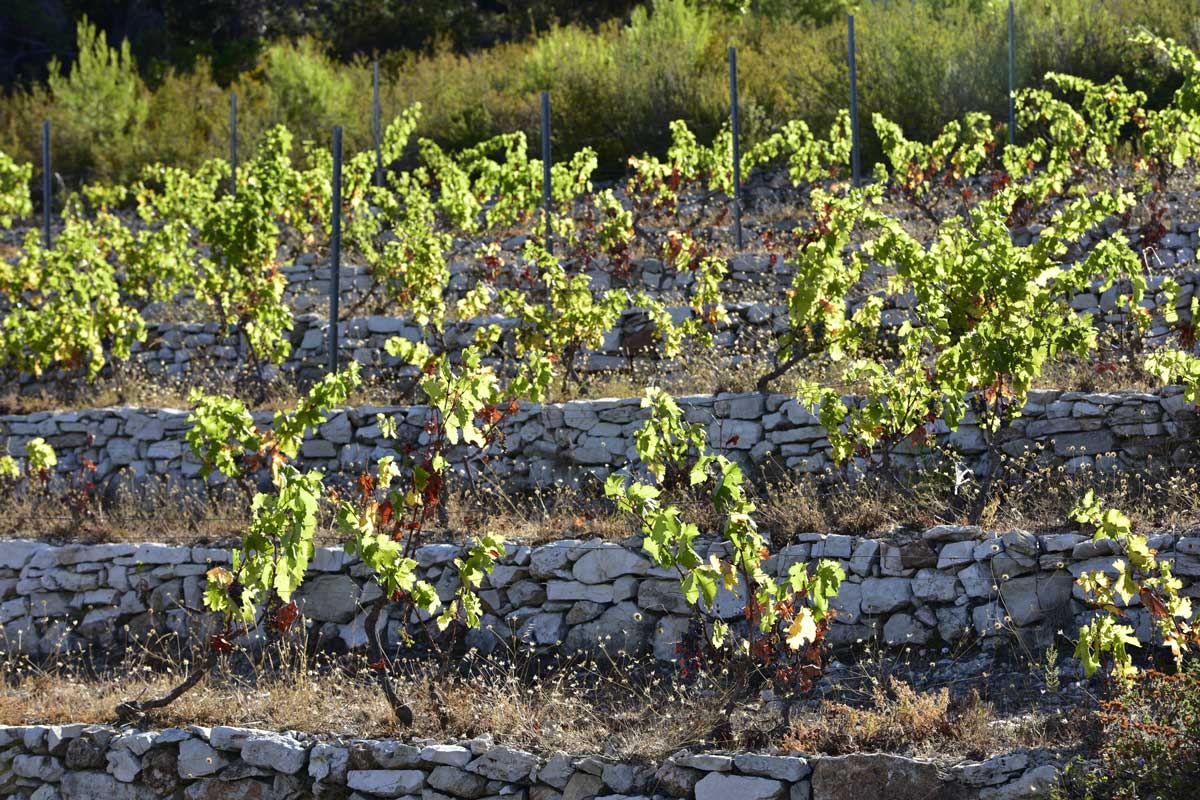
Most famous Croatian islands for wine lovers
Welcome to the enchanting world of Croatian islands, where a confluence of ancient winemaking traditions, unique terroirs, and indigenous grape varieties creates an unforgettable experience for wine enthusiasts. In this chapter, we delve into the most famous Croatian islands that have captured the hearts of wine lovers, unveiling a tapestry of flavours and stories woven into each bottle.
Hvar island
One of the prominent wine regions in Croatia is the island of Hvar, often referred to as the “island of wine.” With a history of winemaking that spans over two millennia, Hvar is one of the oldest wine-producing regions in Europe. The island’s winemakers take pride in preserving ancient winemaking techniques and cultivating indigenous grape varieties like Plavac Mali, Bogdanuša, Darnekuša and Parč. Plavac Mali, in particular, is highly regarded for its robust red wines with flavours of dark berries, spices, and a distinct Mediterranean charm.
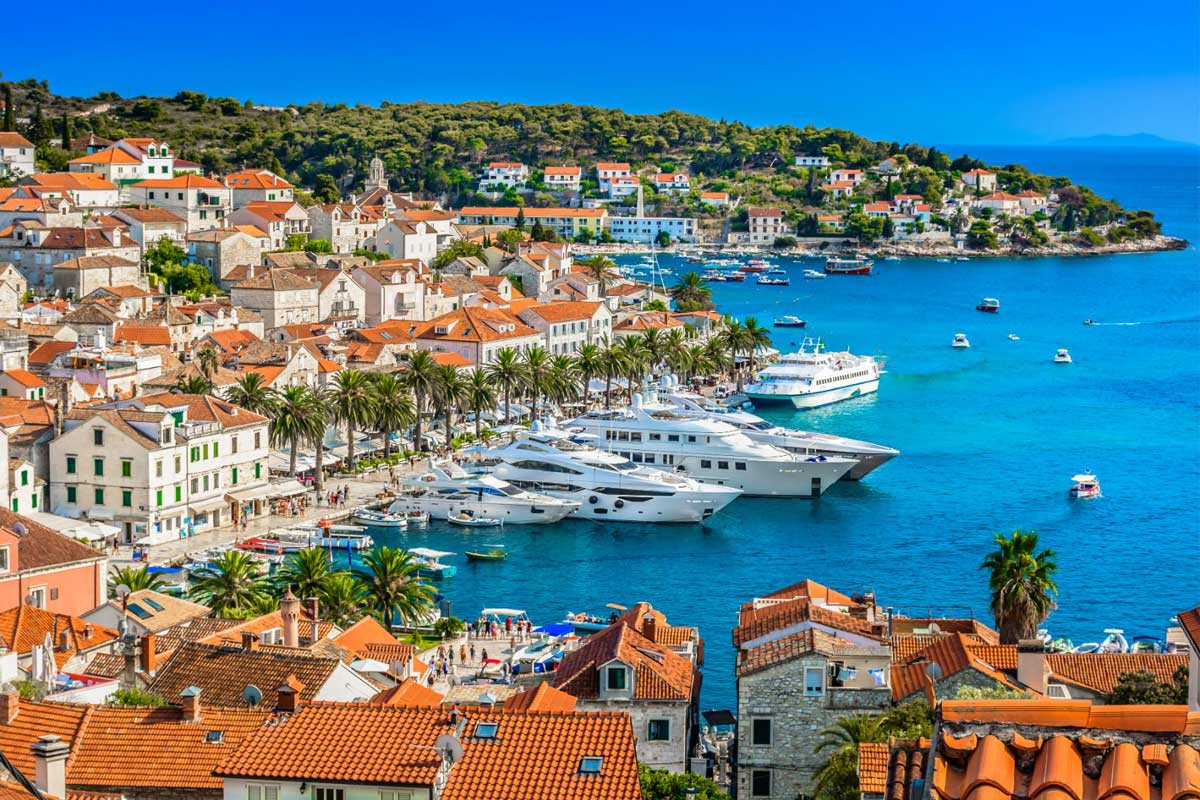
Korčula island
Korčula, another picturesque island in Croatia, is celebrated for its winemaking heritage. The island is home to the Pošip grape variety, which thrives in the island’s limestone-rich soils and enjoys abundant sunshine. Pošip wines from Korčula often exhibit a bright acidity, floral aromas, and citrusy notes, making them a nourishing choice for white wine enthusiasts.
Vis island
Moving to the southern Adriatic, the island of Vis is emerging as a notable wine destination. Here, the autochthonous Vugava grape reigns supreme, producing elegant white wines with floral undertones and a hint of minerality. The island’s unique position and maritime climate contribute to the grapes’ optimal ripening conditions. For example, Plavac mali shows unique characteristics and the ability to absorb the extreme sun and remain balanced.
Brac island
Another beautiful island, stands out for its expression of native white grape variety, Pošip, which yields rich and flavorful wines with a pronounced fruity character. Additionally, the island cultivates Plavac Mali for its red wines, echoing the bold and expressive style found in the nearby regions.
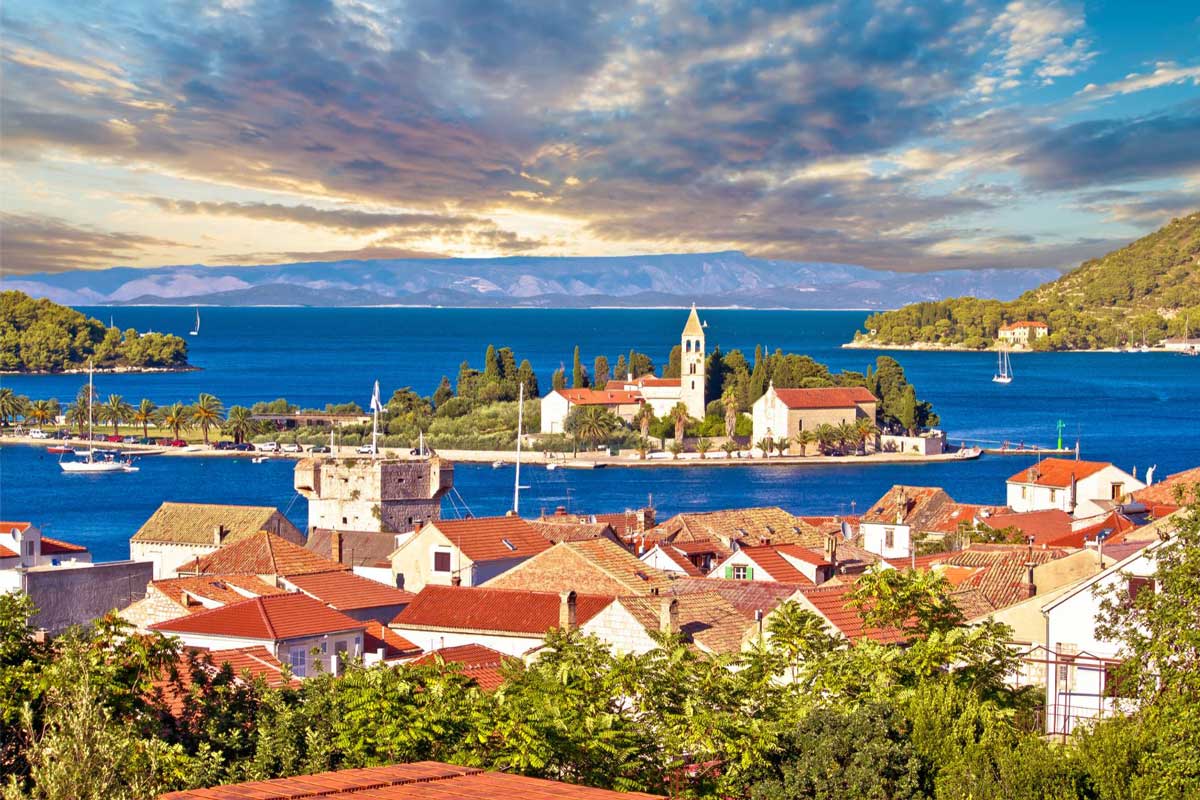
Throughout the Croatian islands, winemakers often embrace traditional and organic winemaking methods, maintaining a deep connection to their land and heritage. Visitors to these island wineries are not only treated to delightful wines but also get to experience the warmth and hospitality of the local winemaking communities.
In conclusion, Croatia’s islands offer a treasure trove of wines that have been cherished for centuries. With an emphasis on indigenous grape varieties, diverse microclimates, and centuries-old winemaking traditions, the wines from Croatian islands add another layer of richness and complexity to the tapestry of Old World island wines. Whether you explore the ancient vineyards of Hvar, the aromatic wines of Korčula, or the emerging gems of Vis and Brac, you’ll find that Croatian island wines are a testament to the country’s rich winemaking heritage.
Vis island wines
Wines from the island of Vis in Croatia are an exquisite discovery waiting to be rediscovered.
Vis, a mesmerising island in the Adriatic Sea, boasts a winemaking history that dates back centuries. Isolated from the mainland for much of its past, Vis has preserved its authentic winemaking traditions, cultivating indigenous grape varieties and producing wines that reflect the island’s unique microclimate and terroir.
One of the standout grape varieties from Vis is Vugava, a white grape indigenous to the island. The Vugava wines are revered for their pronounced aromatics, refreshing notes, and excellent structure, making them a delightful choice for those seeking a refreshing and aromatic white wine experience.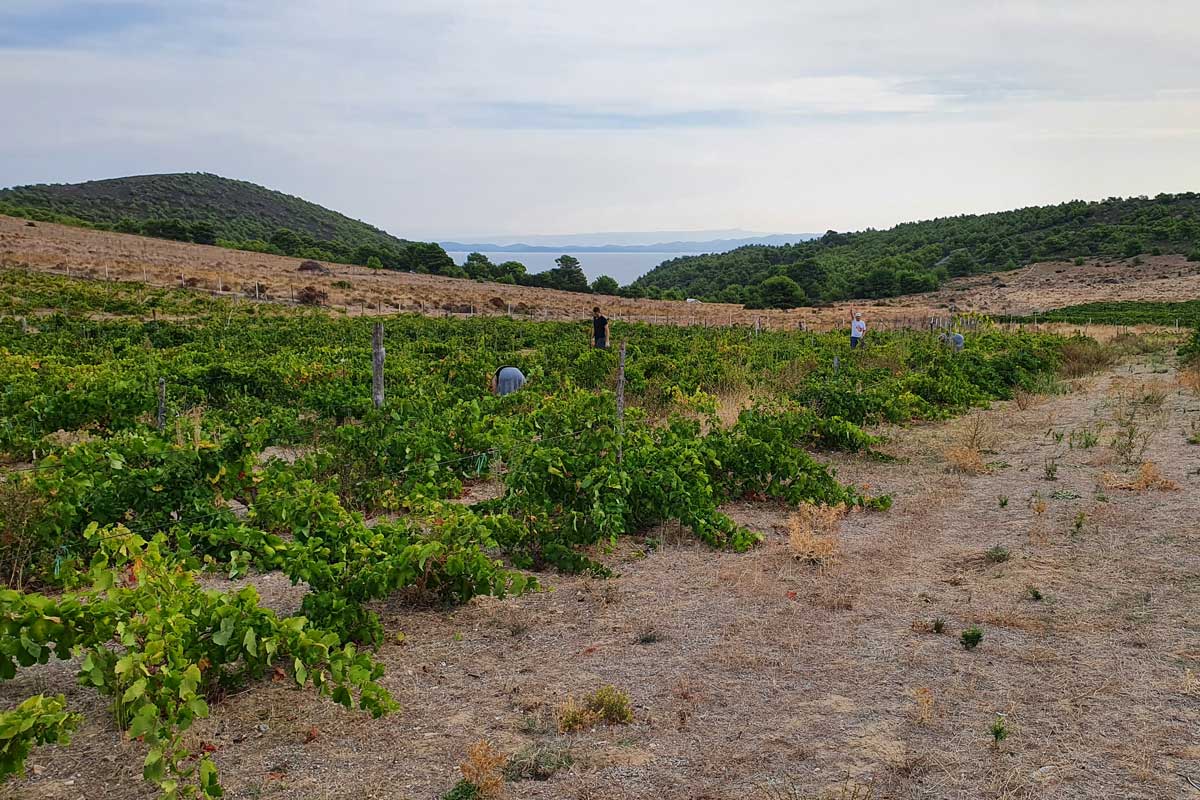
Additionally, Vis is known for its red wines crafted from the Plavac Mali grape, a relative of the renowned Zinfandel variety. The Plavac Mali wines from Vis often exhibit bold flavours of dark berries, Mediterranean spices, and a touch of minerality, reflecting the island’s rocky and sun-kissed landscape. Furthermore, Plavac from Vis is known for its ability to achieve balanced wines despite having the highest alcohol levels.
Visiting the local wineries on this picturesque island offers an opportunity to immerse oneself in the island’s winemaking culture and savour the fruits of their labour. With its stunning coastal vineyards, welcoming hospitality, and a sip of history in every glass, wines from Vis are an invitation to embark on an unforgettable vinicultural journey.
There are no island wines without island wineries
Some notable wineries on the island of Vis contribute to the production of Vis island wines and showcase the island’s unique winemaking heritage:
- Vislander Winery
- Lipanović Winery
- Roki’s Winery
- Senjanović Winery
- Bunčić Winery
These wineries, among others, contribute to the rich tapestry of Vis wines and play a vital role in preserving the island’s winemaking heritage. Each one reflects the unique characteristics of the island’s terroir and the dedication of the local winemakers, ensuring that there are only island wines with the heart and soul of island wineries.
Vislander – interpreter of Vis island terroir
It is a treat being able to compare four different Plavac mali wines bottled, each under its own label. Vislander Winery is the only winery on Vis that separately vinifies Plavac mali grapes from single-vineyard positions.

Dedication to Vis terroir is essential when interpreting the varieties and culture of Vis island wines. The vineyards are cultivated traditionally, without using mineral fertilisers or synthetic pesticides, maximally respecting the health of the soil, vines and animal life.
Vislander is also the only Vis island winery making the lineup of wines from sparkling to aged red, including refreshing still whites, aged whites, and rose.
This is thanks to the numerous vineyards on the island that Vislander farms. These vineyards are traditionally home to Vugava (Bugava), Kuč, and Plavac Mali grapes.
Each label is a devoted testament to the unofficial appellations of Vis Island. Named after the family forefathers and mothers that inherited and passed down tradition, wine labels use unique symbolism to shape their image using topographic map markings.
We envy anyone who can visit a winery on an island. Discovering the basics of Vis viticulture and the opportunity to taste the varieties Plavac mali and Vugava, indigenous to the island Vis, are a privilege.
Of course, Wine&more is here for everybody, like ourselves, who cannot visit but would like to have a taste of Vis Island nevertheless.
You can order Vislander wines online and have it delivered to your doorstep. In that sense, you are one step away from the place where time itself runs differently – Vis Island.
